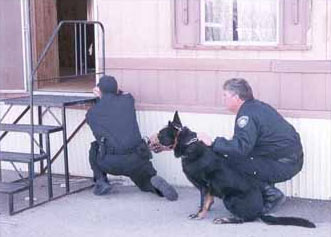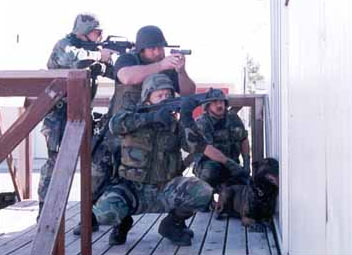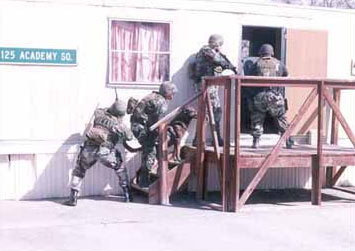The German Shepherd as a Police Service Dog
Foreword by Ed Frawley
I met Kevin Sheldahl in 1984 at a police K-9 school in Kansas. We have been good friends ever since. Kevin is a retired police K-9 handler. He became a K-9 Instructor and an International Police Dog Judge. Kevin's company K-9 Services runs 6-week police K-9 courses in which police officers learn how to become new K-9 handlers. To date, he has run 70 6-week courses and trained over 1,200 K-9 handlers. I don't know of another dog trainer that has Kevin's experience and knowledge of police service dogs training.
What of the GSD in Police work today? The PSD of today may work in a rural or even wilderness environment where the primary function of the K-9 Team is Search and Rescue. Alternately, the team may be a specialty unit within one of the world's great industrial cities where apprehending armed suspects who have fled from attempts to apprehend them are their only job. The majority of the K-9 Teams that exist today fall within a broad range in between these extremes. In addition there are specialty teams whose sole responsibility may be the detection of contraband, cadavers, explosives, or the trailing of suspects. To adapt to a range of behaviors as broad as the demands upon the modern service dog takes a superior animal. Does the German Shepherd of today measure up?
In selecting dogs for the work it is usual to look towards dogs bred for the role as working dogs. In searching for these animals PSD instructors have been turning more and more to eastern countries for GSD's and to other breeds such as the Malinois and Dutch Shepherd varieties found in Holland, Belgium, and with growing frequency even in Germany. Ongoing talks between the SV and representatives of the German Police have seemed to produce no increase in the number of serviceable German Shepherds available for Police use in the German Shepherds home country. This factor may have in part led to the International Deutcher Meisterschaft being removed from the Bundesiegerprufung where it has historically been run alongside the civilian GSD working championship. The total number of German Shepherd Dogs employed by the German Police continues to plummet. At least in one state less than half of the Service Dogs are German Shepherds. Here in the U.S. the German Shepherd is often considered a lesser dog than some of the alternate breeds available for purchase. Very few of the GSD Police dog candidates available can claim Germany as their place of origin. Even among the USA Schh III Championships a minority of the dogs have Germany as a birthplace and many of the producers of the Bundesseiger participants claim other countries of origin.

Numerous reasons have been put forth as the decline of the GSD in police work. The increase in the popularity of the German Shepherds whose primary breeding objective has been the show ring, a failure of the breeding public to recognize the working traits in breeding pairs. The sport has been criticized in its failure to weed out the less than desirable candidates from the gene pool. The lack of strong selection for fighting instinct in the korung, no evaluation of play drive in the korung, the tendency to breed based on Schh scores instead of the totality of working ability of the dog. Have all been said to be contributing factors.
Arguments are many and to assign blame for the loss of the working foothold the GSD has held since Max V. Stephanitz popularized the breed based on its working ability is impossible nor is it really useful. What must happen if the GSD is to continue to make an impact in the application of working ability within the law enforcement community is that the candidates must be available. In choosing an individual animal for inclusion into the ranks of police service dogs' responsible instructors will reject the lesser animals, and if this is the GSD so be it. The police are in the business of finding suspects, evidence, and apprehending criminals. If the traditional GSD no longer provides for these needs responsibility dictates that candidates are sought elsewhere.
What needs to be done? Here is the area where no one agrees on how to fix the problem or whether there is even a problem to fix. Advocates of the working show dog say that the working dog must come to the show standard and advocates of the working lines say that this will only degrade the working ability of the GSD even further. The Police have demonstrated one solution in the German state of Northrhine-Westfalia. The state has developed a breeding program for both he GSD and unregistered dogs of Malinois type whose background is out of Holland. The goal is to provide healthy working specimens for the police. The majority of the police dogs used as PSD's are now bred by the state in Northrheine-Westfalia. This solution may expand among jurisdictions, which have the facilities, know how, and financial support for such a program. Here in the U.S. the possibility for such an endeavor among virtually all jurisdictions is most likely impossible. The reliance of local law enforcement on imports from abroad and from hobby breeders will continue. It is in this arena that the hobby breeder can support their local law enforcement efforts through the development of a breed program, which places the greatest emphasis on healthy dogs of exceptional working ability.

Often breeders complain about not being able to place the progeny they have with working homes. As the supply of working candidates continues to be less than the growing demand for service dogs this situation can and will change. But, only if the GSD production results in serviceable police dog candidates will responsible breeders, sport enthusiasts, law enforcement and others that need working drives in their dogs seek out the GSD. If the working test, the korung, and the designs of the breeders do not correspond to this the answer will be in using lower quality dogs or simply discontinuing the use of the GSD in canine programs.
Currently, a large number of handlers and agencies seek alternate breeds for application as PSD's. The GSD is being bypassed due to a consensus that there are too few with adequate drives to perform the rigorous duties as a PSD. In addition the technology of applying service dogs in a wide variety of environments and tasks has placed increasing demands on the dogs placed in service with Law Enforcement. Today the application of the PSD to work in coordination with a SWAT Team is commonplace where small deficiencies in environmental security, sound sensitivity, and nervous thresholds become readily apparent and may cause failure in a critical task.
The demands on control of the PSD have increased immensely in light of the litigious society that exists today. Certainly not less important there is the need for control to maintain the safety of the handler and other law enforcement personnel involved in the apprehension of armed violent suspects who have chosen to flee and hide from law enforcement efforts to apprehend them. As such deployments become more commonplace the demands on the character and temperament of the service dogs rise. All sport enthusiasts are aware that the ability to control a dog comes from the animal's courage and hardness as well as a good dose of trainability, in the past always the hallmark of the GSD.

Scent work is now focused on working in urban and suburban environments where tracking often is performed over difficult terrain including pavement and through areas where a large number of people reside and contaminate a would be track. Additional scent work has been added through the efforts of law enforcement to investigate drug importation and distribution, arson, clandestine grave sites and various other forensic applications. Search and Rescue, and Disaster Search have been on the increase as people flock to our wilderness areas for recreation. Disaster aid is in demand worldwide due to natural occurrences and the real threat of terrorist actions. Unfortunately, the scent work application in sport is minimal and does not present an adequate standard for producing progeny, which are predisposed to this type of application. The German Police have discussed adding retrieval exercises to the korung of breeding candidates for several years without a corresponding test being added by the SV. Such a test would provide at least one important characteristic that is used in almost all scent work applications, the desire to search and retrieve a variety of objects.
The GSD has held sway over the police canine arena since the turn of the century. In the past it has been held as the example for other breeds to attain. Unlike herding where many breeds have demonstrated the ability to perform this task, often at a level higher than the GSD, no breed has endeared itself to law enforcement and others in need of a strong working dog like the GSD. Although the breed is a multi-purpose breed doing tasks such as guide dog for the blind, search and rescue, and home companion/protector the GSD has been king of the police service dog for nearly its entire existence. With the change in emphasis towards beauty and elegance among the GSD breeders the breed may be abandoned by law enforcement. The GSD is at risk to becoming what Max Von Stephanitz said it was not: “a fancy dog.”











Ask Cindy.